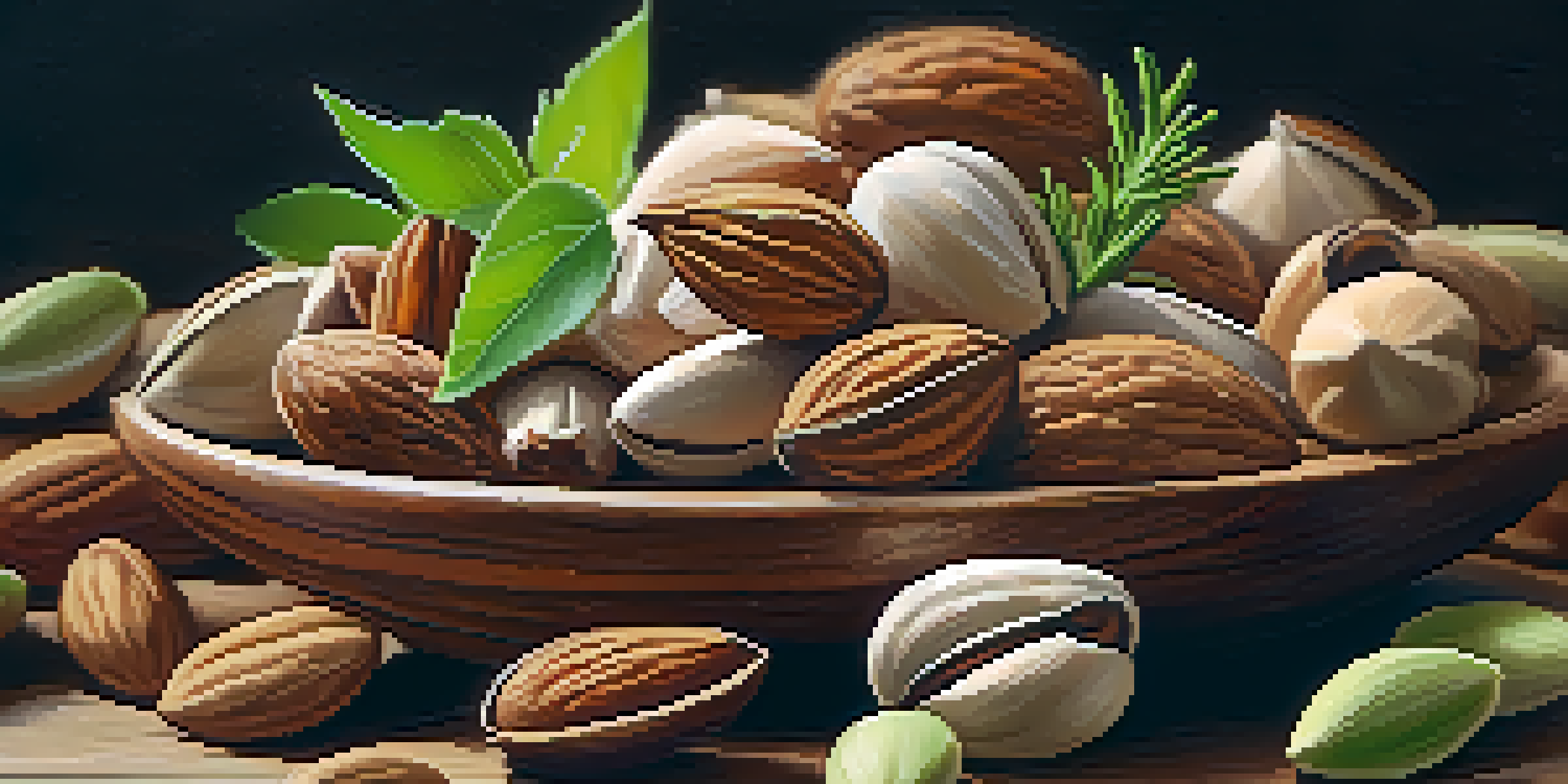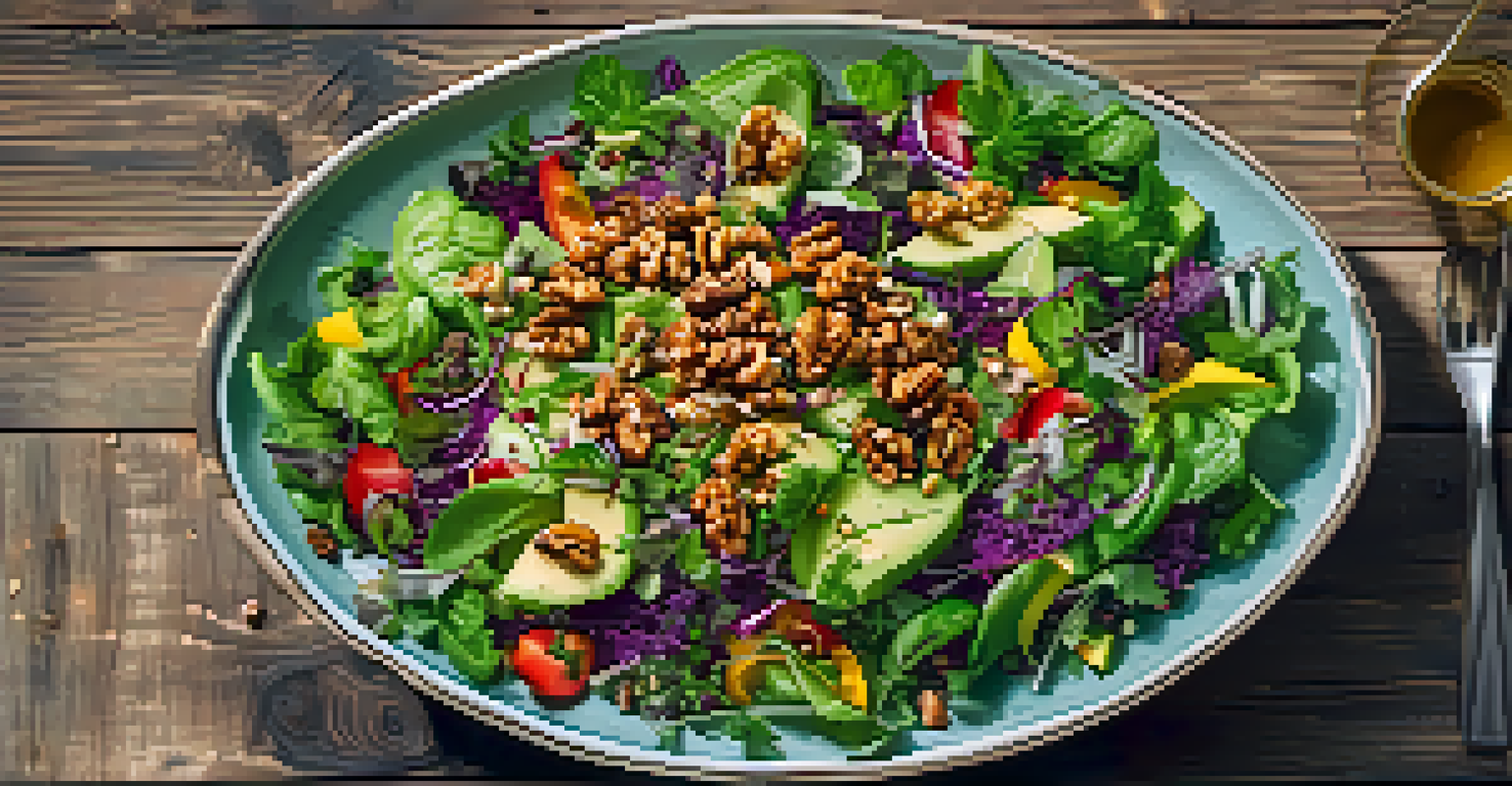Discovering the Health Benefits of Nuts in Vegan Cooking

Nuts: A Nutritional Powerhouse for Vegans
Nuts are often hailed as a nutritional powerhouse, and for good reason. Packed with essential nutrients like protein, healthy fats, and fiber, they make a perfect addition to any vegan diet. For instance, almonds provide vitamin E, while walnuts are rich in omega-3 fatty acids, which are crucial for heart health.
Let food be thy medicine and medicine be thy food.
Incorporating nuts into your meals not only boosts nutritional value but also enhances flavor and texture. Think about the crunchiness of a walnut in a salad or the creaminess of cashew sauce in your pasta. These small additions can transform a simple dish into a culinary delight.
Moreover, the healthy fats found in nuts can help keep you satiated, making them an excellent snack option. Whether you're on a busy schedule or looking for a post-workout snack, nuts can provide the energy and nutrients you need without the guilt.
Heart Health: The Role of Nuts in Vegan Diets
Heart health is a major concern for many, and incorporating nuts into your vegan diet can make a difference. Studies have shown that regular nut consumption is associated with lower cholesterol levels and reduced risk of heart disease. This is particularly important for vegans, who might be more susceptible to certain heart health issues due to dietary restrictions.

Nuts like pistachios and almonds are particularly beneficial because they contain high levels of antioxidants and healthy fats. These components help combat inflammation and support overall cardiovascular health. By simply adding a handful of nuts to your daily routine, you can make a significant impact on your heart health.
Nuts Boost Vegan Nutrition
Nuts provide essential nutrients like protein, healthy fats, and fiber, making them a perfect addition to any vegan diet.
Additionally, nuts are an excellent source of magnesium, which is crucial for maintaining a healthy heart rhythm. So, the next time you’re whipping up a vegan meal, consider tossing in a mix of your favorite nuts for a heart-healthy boost!
Nuts and Weight Management in Vegan Diets
When it comes to weight management, many people shy away from nuts due to their calorie density. However, studies suggest that nuts can actually aid in weight loss when consumed in moderation. Their combination of protein, fiber, and healthy fats helps keep you feeling full, reducing the likelihood of overeating.
Eating nuts regularly can improve your health and help you live longer.
For example, a small handful of walnuts can satisfy your hunger and provide essential nutrients without the need for additional snacks. This is particularly beneficial for vegans who may struggle to find filling, nutritious foods. By integrating nuts into your meals, you can create a balanced diet that supports your weight goals.
Furthermore, nuts can also boost your metabolism, aiding in weight management. The healthy fats found in nuts are metabolized differently than those in processed foods, which can lead to fat loss when incorporated wisely into your diet.
The Role of Nuts in Plant-Based Protein Sources
Protein is a key component of a healthy diet, especially for vegans. Nuts are an excellent source of plant-based protein, providing a convenient way to meet your daily requirements. For instance, peanuts contain about 7 grams of protein per ounce, making them a fantastic option for snacking or adding to meals.
Additionally, nuts can complement other plant-based protein sources such as beans and lentils. By combining them in meals, you can create a complete protein profile, ensuring you’re getting all the essential amino acids your body needs. This is particularly useful for those on a strict vegan diet, where protein sources can sometimes be limited.
Nuts Promote Heart Health
Regular nut consumption can lower cholesterol levels and reduce the risk of heart disease, which is vital for maintaining cardiovascular health.
Incorporating nuts into smoothies, salads, or even as toppings for oatmeal can significantly enhance your protein intake. This not only supports muscle health but also provides sustained energy throughout the day.
Nuts: Natural Sources of Healthy Fats
One of the most significant health benefits of nuts is their content of healthy fats. Unlike saturated fats found in many animal products, the unsaturated fats in nuts can help improve cholesterol levels and promote heart health. For example, almonds and hazelnuts are rich in monounsaturated fats, which are known to be beneficial for overall health.
Incorporating these healthy fats into your vegan cooking can lead to a more balanced diet. You can use nut oils for salad dressings or drizzle almond butter over your favorite fruits for a nutritious snack. The possibilities are endless, and the flavors can elevate any dish.
Moreover, these healthy fats play a crucial role in nutrient absorption. Certain vitamins, like A, D, E, and K, are fat-soluble, meaning they need fat for your body to absorb them effectively. Adding nuts to your meals ensures that you’re not only enjoying delicious food but also maximizing the nutritional benefits.
Nuts as Flavor Enhancers in Vegan Cooking
Nuts are not just nutritious; they're also incredible flavor enhancers in vegan cooking. They add a delightful crunch and depth to meals, making them more satisfying and enjoyable. Think about how toasted pine nuts can elevate a simple pesto or how roasted walnuts can bring a nutty richness to a salad.
In addition to their texture, nuts can provide a creamy element when blended into sauces or dips. For example, cashews can be soaked and blended to create a rich, creamy base for vegan cheese or dressings. This versatility makes nuts a valuable ingredient in any vegan kitchen.
Nuts Aid in Weight Management
When consumed in moderation, nuts can help with weight loss by keeping you full and satisfied, making them a great snack option.
Using nuts in your cooking can also be a great way to introduce variety to your meals. By experimenting with different types of nuts, you can create unique flavors and textures that keep your palate excited and engaged.
Allergies and Alternatives: Navigating Nut Use in Vegan Cooking
While nuts are incredibly beneficial, it's important to acknowledge that some people have nut allergies. This can pose a challenge for those who want to incorporate nuts into their vegan cooking but must find alternatives. Luckily, there are plenty of other nutritious options available that can mimic the texture and flavor of nuts.
Seeds, such as sunflower or pumpkin seeds, are excellent substitutes that provide similar health benefits without the allergy risks. They are packed with protein, healthy fats, and essential vitamins, making them a great addition to salads, smoothies, or baked goods.

Furthermore, experimenting with nut-free butters made from seeds can open up new culinary possibilities. Sunflower seed butter, for example, offers a creamy, nutty flavor and can be used in place of almond or peanut butter in various recipes, ensuring that everyone can enjoy the health benefits of these ingredients.